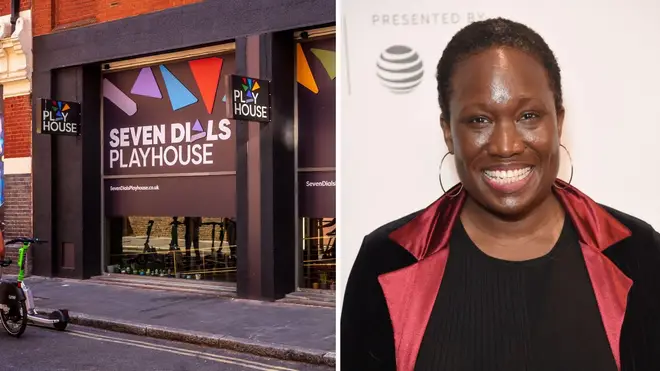
Richard Spurr 1am - 4am
8 March 2024, 13:16

A second play in London has announced theatre 'Black Out' nights despite No10 condemning the performances as "wrong and divisive".
BLUE, a play which has just opened at Seven Dials Playhouse, has announced that it is holding two Black Out nights on 18th and 27th of March.
The show, which stars Mindhunter actress June Carryl, looks at racism in policing in the US and UK.
It is following in the footsteps of Slave Play, which has been criticised for introducing performances specifically for an "all-Black identifying audience".
Downing Street condemned the concept, claiming it was "wrong and divisive".
Prime Minister Rishi Sunak's official spokesman said: "The Prime Minister is a big supporter of the arts and he believes that the arts should be inclusive and open to everyone, particularly where those arts venues are in receipt of public funding.
"Obviously, these reports are concerning and further information is being sought.
"But clearly, restricting audiences on the basis of race would be wrong and divisive."
Black audience-only performances, also known as Black Outs, aim to get Black people into the theatre - an otherwise white-dominated space.
Addressing the planned Black Out performances for BLUE, Ms Carryl said: "I’m genuinely surprised by the government's comments last week. And I've never understood the issue with Black Out nights.
"That someone suddenly takes it personally, that a space isn’t meant to centre them, is precisely the point. It’s like in college, no one ever asked why the football players sat together at meals. Just the Black kids."
She continued: "When you live in a culture that centres someone else, when you constantly move through space that isn’t built for you – the buildings aren’t yours, the signs aren’t yours, the laws aren’t yours, the language, the stories aren’t meant to include you – it is exhausting, deadening, a kind of psychic erasure.
"You don’t even know it’s happening until you suddenly find yourself included, in fact, welcomed, centred. There is a sense of relief, connection with self and others.
"Part of what it is to be Black or Brown in a white world is that we don’t live in the same world. We aren’t all invited all the time. That one shares a common set of experiences about the world isn’t offensive. It just is."
She went on to give the example of Thelma and Louise - a film she was told was universal for women but she soon found herself to be the "butt of the joke" in the filmmaker's eyes.
Ms Carryl continued: "Why Black Out nights? Because different audiences get different things from a performance when they are amongst those who share common joys, common wounds. There is communion. It’s one night.
"No one's saying you can't go. But if you begrudge and take offence to that one night, then what you are saying is, 'this has to be mine, too.'And if that is honestly how you feel, then maybe the problem is you."
Seven Dials and No Boundaries Theatrical Productions said: [Black Out night is] a special night where Black identifying guests are invited to enjoy the show and are welcome to linger after the performance with the playwright, cast, and director.
"Theatre is historically a majority white space and these evenings are an invitation to shift the norm.
"Black Out nights are designed to create an upbeat environment for BIPOC identifying audience members, and are often offered when a show’s subject matter might be more comfortable for people to be surrounded by a large number of their affinity group.
"This is not to deter white audience members from attending but an explicit invitation to make people feel welcome and comfortable."